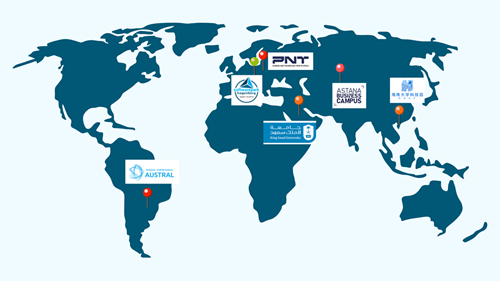IASP welcomes six new members in July 2025
/July_2025_new_members.png)
July saw the addition of six new full members to our association from Argentina, Austria, China, Kazakhstan, Poland, and Saudi Arabia, further strengthening our global presence across nearly 80 countries. We proudly present these new members to our network with a summary of their innovation spaces:
Parque Empresarial Austral is located in Pilar, just outside Buenos Aires, Argentina. Designed to foster collaboration between academia and industry, it serves as a unique ecosystem for innovation, research, and sustainable business development. Founded in 2006 and officially launched in 2010, the park spans 26 hectares with over 25,000 m² of built infrastructure. It is home to around 70 companies and startups from sectors including biotechnology, healthcare and, software engineering.
Integrated within the Austral University Campus, the park benefits from direct access to the IAE Business School, the Austral University Hospital, and a network of 8 faculties and over 1,200 researchers across 27 laboratories and research centers. In 2025, the park partnered with Energeia to become Argentina’s first science-tech business park fully powered by renewable energy.
Softwarepark Hagenberg, located nearby Linz, Austria, is a dynamic center for innovation, research, and technology. Founded in 1989 as a spin-off of Johannes Kepler University Linz, the park covers 20 hectares, seamlessly integrating historic charm, such as the landmark Schloss Hagenberg, with state-of-the-art infrastructure.
Today, Softwarepark Hagenberg is home to 11 renowned research institutes, 24 academic programs centred on computer science, data science, and digital technologies, and more than 75 IT companies ranging from agile startups to global tech leaders. With a community of around 3,000 individuals - including 1,600 students, researchers, and employees - the park continues to grow, driven by over €100 million in public and private investment.
The Hainan University Science Park was established in 2023 in Haikou City on Hainan Island, China, as a strategic initiative of Hainan University, designed to bridge academia and industry while promoting technology transfer and entrepreneurial development. Spanning 190,000 m2, the park currently hosts 26 companies engaged in a range of forward-looking activities.
With a strong focus on research and development, the park supports critical fields such as biotechnology, environmental sciences, information technology, engineering, and marine sciences. In addition, the park offers robust support for startups and entrepreneurs, providing access to resources, funding opportunities, and a nurturing environment tailored to science and tech-based enterprises.
Astana Business Campus (ABC) is an innovation and technology cluster located in Astana, Kazakhstan. Established by the Social Development Fund (a subsidiary of Nazarbayev University), ABC serves as a modern innovation ecosystem designed to develop Kazakhstan's knowledge-based economy by providing entrepreneurs with state-of-the-art facilities, resources, and a supportive community.
The campus focuses on high-tech industries, including energy, information and communication technologies, biotechnology, and robotics. Among the services offered are a business incubator, business accelerator, technopark, FabLab, and Digital Creativity lab. The community of ABC includes 30+ resident companies closely collaborating with Nazarbayev University’s faculty, researchers, and students. In partnership with Stanford University's StartX accelerator, ABC also offers startups the opportunity to participate in a program that provides mentorship, training, resources, and access to a network of entrepreneurs.
The Science and Technology Park in Opole (Park Naukowo‑Technologiczny w Opolu, PNT), Poland, is a non-profit business-environment institution founded in November 2012 by the City of Opole. Spanning a surface area of 30,000 m2, the park currently has 224 companies and includes state‑of‑the‑art labs and engineering centres, a first rated‑3 data centre, a business incubator, coworking zones and a modular implementation hall.
In addition to supporting startups and established enterprises, the Science and Technology Park in Opole actively fosters innovation through strategic partnerships, R&D initiatives, and EU-funded projects. It plays a crucial role in the regional innovation ecosystem by providing technical expertise, access to funding opportunities, and tailored development programs for entrepreneurs.
King Saud University (KSU), established in 1957 in Riyadh, spans over 2,224 acres and serves a community of more than 60,000 students. Central to this ecosystem is the King Saud University Science and technology Park, anchored by several specialized centers and initiatives, including the Innovation Center, which focuses on energy, water security, biotechnology, and IT, and facilitates partnerships with both public and private sectors.
The Entrepreneurship Institute, established in 2008, empowers aspiring entrepreneurs through incubation, training, and support services, currently hosting 127 incubated companies and more than 950 businesses on campus. The Engineering Innovation Center enhances student-driven innovation through access to cutting-edge tools and resources, while the Technology Transfer Office plays a critical role in managing intellectual property and commercializing research.
Join us on welcoming these peers to our global network, which continues to unite innovation spaces worldwide in our ongoing mission to drive growth and internationalisation for our community.
/)


/canvascolor(0xffffffff)/RSTP_Logo-01_8.png)
/canvascolor(0xffffffff)/Saigon_Hi-Tech_Park.svg_9.png)
/canvascolor(0xffffffff)/2017_08_04_fundecyt-pctex-h.png)
/canvascolor(0xffffffff)/MemberLogo-36401-6008.png)
/canvascolor(0xffffffff)/MemberLogo-75801-6122.jpg)
/canvascolor(0xffffffff)/ZGC_Group_SP_logo_1.png)
/canvascolor(0xffffffff)/2019_08_30_UK_Here_East.jpg)
/canvascolor(0xffffffff)/MemberLogo-68701-6096.jpg)
/canvascolor(0xffffffff)/MemberLogo-5673-6109.jpg)
/canvascolor(0xffffffff)/MemberLogo-5826-6312.jpg)
/canvascolor(0xffffffff)/iZET_logo_3.png)
/canvascolor(0xffffffff)/sztip_logo_allo_1.png)
/canvascolor(0xffffffff)/logo_19.png)
/canvascolor(0xffffffff)/1200px-Logo_Sophia_Antipolis_12.png)
/canvascolor(0xffffffff)/2019_11_22_India_IKP.jpg)
/canvascolor(0xffffffff)/2024_Nigeria_Solution_Innovation_District.jpg)
/canvascolor(0xffffffff)/LOGO_PNT_EN_pelna_nazwa_(granatowe)_1.png)
/canvascolor(0xffffffff)/2023_10_23_Sweden_Sandbacka_SP.jpg)
/canvascolor(0xffffffff)/Logo_ITP-01_1.jpg)
/canvascolor(0xffffffff)/logotecnopole_alta_resolucion_1.jpg)
/canvascolor(0xffffffff)/2017_11_13_UK_NETPark.jpg)
/canvascolor(0xffffffff)/acronimo_nombre3l_6.jpg)
/canvascolor(0xffffffff)/Logo_ZEDE_Color_1.jpg)
/canvascolor(0xffffffff)/MemberLogo-5769-6232.jpg)
/canvascolor(0xffffffff)/logo_2_(para_rodape_)_1.png)
